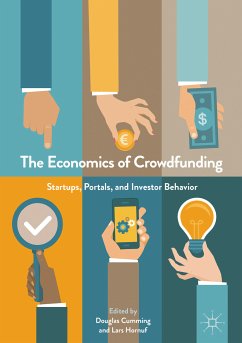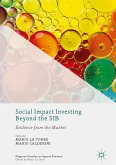'For academics, practitioners and government policymakers, this book provides a sophisticated, comprehensive analysis of this new and important means of capital aggregation across for-profit and nonprofit sectors worldwide.'
- Mingfeng Lin, Associate Professor of Management Information Systems, University of Arizona
'It is important that we recognize and respond to the opportunities and challenges arising from innovative methods of financing, such as crowdfunding. This book provides a review of the experience to date, covering important issues such as signaling, fraud, and regulatory models. The insights here are relevant to academics, entrepreneurs, investors, and policymakers.'
-
Maureen Jensen, Chair and CEO of the Ontario Securities Commission
This book focuses on various types of crowdfunding and the lessons learned from academic research. Crowdfunding, a new and important source of financing for entrepreneurs, fills a funding gap that was traditionally difficult to close. Chapters from expert contributors define and carefully evaluate the various market segments: donation-based and reward-based crowdfunding, crowdinvesting and crowdlending. They further provide an assessment of startups, market structure, as well as backers and investors for each segment. Attention is given to the theoretical and empirical findings from the recent economics and finance literature. Furthermore, the authors evaluate relevant regulatory efforts in several jurisdictions. This book will appeal to finance, entrepreneurship and legal scholars as well as entrepreneurs and platform operators.
- Michael Klausner, Nancy and Charles Munger Professor of Business and Professor of Law, Stanford University
'This is an excellent book, a must-read, for anyone interested in the broad phenomenon of crowdfunding.'
- Mingfeng Lin, Associate Professor of Management Information Systems, University of Arizona
'It is important that we recognize and respond to the opportunities and challenges arising from innovative methods of financing, such as crowdfunding. This book provides a review of the experience to date, covering important issues such as signaling, fraud, and regulatory models. The insights here are relevant to academics, entrepreneurs, investors, and policymakers.'
-
Maureen Jensen, Chair and CEO of the Ontario Securities Commission
This book focuses on various types of crowdfunding and the lessons learned from academic research. Crowdfunding, a new and important source of financing for entrepreneurs, fills a funding gap that was traditionally difficult to close. Chapters from expert contributors define and carefully evaluate the various market segments: donation-based and reward-based crowdfunding, crowdinvesting and crowdlending. They further provide an assessment of startups, market structure, as well as backers and investors for each segment. Attention is given to the theoretical and empirical findings from the recent economics and finance literature. Furthermore, the authors evaluate relevant regulatory efforts in several jurisdictions. This book will appeal to finance, entrepreneurship and legal scholars as well as entrepreneurs and platform operators.
Dieser Download kann aus rechtlichen Gründen nur mit Rechnungsadresse in A, B, BG, CY, CZ, D, DK, EW, E, FIN, F, GR, HR, H, IRL, I, LT, L, LR, M, NL, PL, P, R, S, SLO, SK ausgeliefert werden.
Es gelten unsere Allgemeinen Geschäftsbedingungen: www.buecher.de/agb
Impressum
www.buecher.de ist ein Internetauftritt der buecher.de internetstores GmbH
Geschäftsführung: Monica Sawhney | Roland Kölbl | Günter Hilger
Sitz der Gesellschaft: Batheyer Straße 115 - 117, 58099 Hagen
Postanschrift: Bürgermeister-Wegele-Str. 12, 86167 Augsburg
Amtsgericht Hagen HRB 13257
Steuernummer: 321/5800/1497
USt-IdNr: DE450055826
Bitte wählen Sie Ihr Anliegen aus.
Rechnungen
Retourenschein anfordern
Bestellstatus
Storno









